‘A Form of Suicide’: Germany’s Economic Woes Created by Its Own Sanctions Policy
19:12 GMT 13.07.2023 (Updated: 19:13 GMT 13.07.2023)

© DANIEL ROLAND
Subscribe
Germany’s economic woes are likely to continue through the end of the year, according to economic research center ZEW, thanks to rising interest rates in the Eurozone and the US and weak export markets.
“The industrial sectors are likely to bear the brunt of the anticipated economic downturn, with profit expectations for these export-oriented industries experiencing a substantial decline once again,” said ZEW President Achim Wambach.
The economy is already in a technical recession. Earlier this week, the Federal Statistical Office revealed that Germany's annual inflation jumped from 6.1% in May to 6.4% in June and the Bundesbank, Germany’s central bank, said it doesn’t expect inflation to return to 2% until at least 2025.
On Thursday, Siemens AG announced a €1 billion ($1.1 billion) investment for an “industrial metaverse” in the Nuremberg industrial region and a new Technology Campus in Erlangen. It’s part of Chancellor Olaf Schoz’s effort to attract businesses back into Germany.
Jacques Sapir, Director of Studies at the School for Advanced Studies in the Social Sciences (EHESS) in Paris, told Sputnik on Thursday that as Europe’s largest industrial economy, Germany's economic health conditions that of the continent, meaning others in the Eurozone could be in for some trouble, and also that Berlin’s ability to lean on its partners is rapidly waning.
“Germany is both an important supplier for other European countries and an important buyer. A lasting recession in the German economy will certainly have significant effects on France, Italy, Spain, Belgium and the Netherlands. If this recession lasts until next spring, the economies of the countries mentioned will also go into depression, which in turn will affect the German economy even more. France has so far maintained weak growth, but growth nonetheless. If the recession persists in Germany, the French economic situation will be affected and it could tip into recession at the end of the year,” he explained.
“The reaction of foreign investors is determined by two factors: the profitability of the investment and the degree of risk incurred by this investment. However, today, investments are much less profitable in Germany due to a rise in production costs, mainly but not solely linked to the rise in energy prices, and the weak vitality of the internal market due to the compression of real wages due to inflation,” he explained. “To this must be added a rise in risks, whether political (the government is made up of an unstable alliance between several parties) or economic (no one knows what the economic future of Germany will be). These different factors combine to discourage some foreign investors from settling in Germany.”
Sapir noted that Germany avoided the major energy crisis that many had predicted for the winter of 2022-23, both because the weather was mild, but also because Berlin shelled out the equivalent of 7% of its gross domestic product (GDP) to insulate German firms from the crisis - a larger amount than it spent on the COVID-19 crisis in 2020 and 2021.
“Germany was able to count on the solidarity of its partners, particularly France and Italy, which provided it with gas and electricity,” he added. “But to say that Germany escaped a major crisis does not mean that there was not an energy crisis in Germany. This affected households, through substantial price increases, but also businesses.”
“When we look at the economic results of last winter, we see that the most energy-intensive companies have suffered. For the coming winter, these different factors are likely to no longer be present, or to be present only to a lesser extent. A second very mild winter is unlikely, and the German government will struggle to keep spending so high. Even European solidarity is not obvious because the economies of neighboring countries will be in a much worse state than last winter and will have a hard time helping Germany in the same way. However, building the infrastructure necessary to ensure that Germany is completely safe from a major energy crisis will take time. It will not be completed before the end of 2025 or even the beginning of 2026. The coming winter therefore promises to be difficult for Germany.”
Sapir noted that Berlin’s problem today “is really the same as it was in World War II” - it lacks raw materials like hydrocarbons and rare earth metals - although this time the crisis is of its own creation.
“The sanctions policy is, from the German point of view, a form of suicide. But, one can wonder if the German political class is not suicidal. The attitude of Germany on the question of nuclear energy raises this question: Germany is doing everything it can to dissuade other countries, including France, from adopting major nuclear programs. However, without these programs, how does it want these countries to be able to sell it the missing electricity?”
“Germany is both an important supplier for other European countries and an important buyer. A lasting recession in the German economy will certainly have significant effects on France, Italy, Spain, Belgium and the Netherlands. If this recession lasts until next spring, the economies of the countries mentioned will also go into depression, which in turn will affect the German economy even more. France has so far maintained weak growth, but growth nonetheless. If the recession persists in Germany, the French economic situation will be affected and it could tip into recession at the end of the year.”



